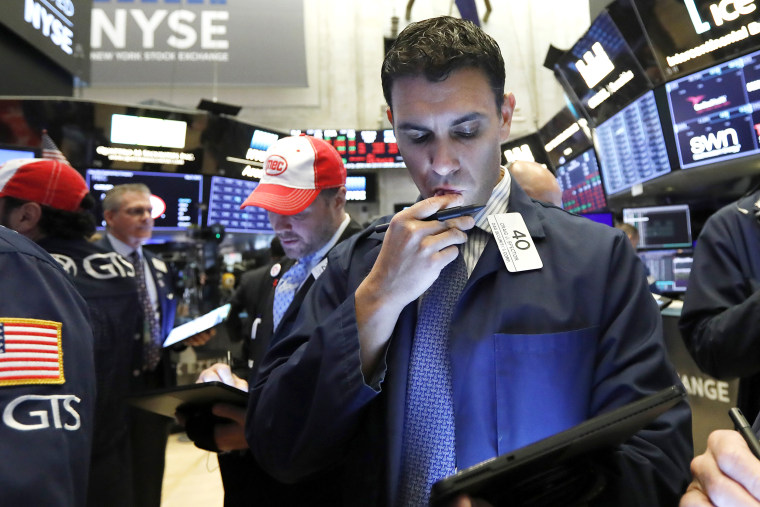President Donald Trump is opening a Pandora’s box of economic consequences that could reverberate around the world, economists warned, as trade tensions with China pushed Wall Street into a nosedive on Monday.
China’s announcement Monday morning to levy tariffs on $60 billion of U.S. imports is likely just the opening salvo, said Jacob Kirkegaard, a senior fellow at the Peterson Institute of International Economics. “It’s clear that retaliation is coming," he told NBC News.
“I would expect virtually all U.S. agricultural exports to be affected,” Kirkegaard predicted. Other industries likely on Beijing’s hit list: Financial services, manufacturing — including major exporters like Boeing and Caterpillar — and technology all could suffer.
“The core underlying fear in the eyes of tech investors is around what this move as well as a retaliation move from the Chinese can do to the tech food chain,” Daniel Ives, managing director of equity research at Wedbush Securities, wrote in a client note. “With worries that Trump potentially plans to enact additional tariffs on Chinese goods down the road if this trade situation spirals further, tech stocks are ultimately caught in the cross fire.”
Although Trump warned China against it, the prospect of retaliation from Beijing was a foregone conclusion, said Peter Petri, a professor of international finance at Brandeis University.
“China had to retaliate, given its humiliating experience in Washington and on Twitter last week. It needs to speak firmly to both its internal and external audiences,” he said.
So far, Beijing’s response has stayed within the realm of tariffs, which some economists say indicates a willingness on the part of Chinese negotiators to still come to a deal.
“It is retaliation, but it’s quite contained and concentrated,” said Ludovic Subran, chief economist at Euler Hermes and global head of macroeconomic research for Allianz. “It’s yet again a wake-up call for the trade commissioner in the U.S. to really engage with them.”
“We know that the tariffs will hurt both economies,” said Doug Barry, spokesman for the U.S.-China Business Council, who expressed some optimism that a trade war could be averted before the tariffs are scheduled to take effect.
“We hope both parties will reflect on all the good that our economic ties have produced and all future good that will happen if a deal is reached,” he said.
So far, the impact of China tariffs on the American economy has been muted; companies have absorbed most of the costs and largely eaten the margin cost, but that won't be sustainable at the wider and steeper tariff levels sought by Trump, economists say. The trade deficit means that Trump’s threat to levy tariffs on the entirety of Chinese imports to the United States gives Beijing a disadvantage in terms of tit-for-tat retaliation. Escalating to non-tariff measures looks both increasingly likely — and more dangerous to the U.S. economy.
“There are lots of different ways they could go if they want to up the ante,” said Mark Zandi, chief economist at Moody’s Analytics. “They could make life difficult for American companies operating in China. Companies need all kinds of approvals and permits and cooperation from Chinese authorities to do business. They could slow that down or bring it to a complete halt.”
Politics complicate the picture, as Trump views the need to obtain a perceived win against Beijing as an essential element of his reelection campaign. “I think, soon enough, people will realize this is a political game for Trump,” said Monica DeBolle, a senior fellow at the Peterson Institute for International Economics. “He’s looking at politics in 2020.”
China also grasps the political value this has to Trump, and will coordinate its countermeasures accordingly, Kirkegaard said. “They’re going to continue to target sectors and industries that are located in Trump areas, swing states. They want to impose as much economic damage on the people that support Donald Trump as they can,” he said.
Other tools in China’s arsenal would inflict damage to it as well as to the U.S., making their deployment less likely but exponentially more risky.
For instance, it could devalue its currency, which would counteract some of the tariff effect by making its exports cheaper, but could trigger an exodus of wealth that could destabilize its own economy. An even more drastic measure would be selling off some of its cache of nearly $1 trillion in U.S. Treasury bonds, which would devalue Beijing’s holdings but also inflict tremendous damage on the American economy.
Zandi said a coordinated communications push — easy to do in an authoritarian state with government-controlled media — to boycott American products altogether is another option for Beijing, one that would target Trump’s particular obsession with the market’s day-to-day movement.
“If they really wanted to created havoc in the stock market, they could boycott iPhones. They could boycott Boeing planes. That would be a direct hit to the stock market, which I think they’ve realized is something President Trump is following very carefully,” he said.
Countermeasures like these could have potentially devastating ripple effects. Subran said the market could lose all of the gains it realized since December’s rout, with the S&P 500 falling by as much as 20 percent. “That could cost much of the value creation that was done between now and January 1st,” he said.
